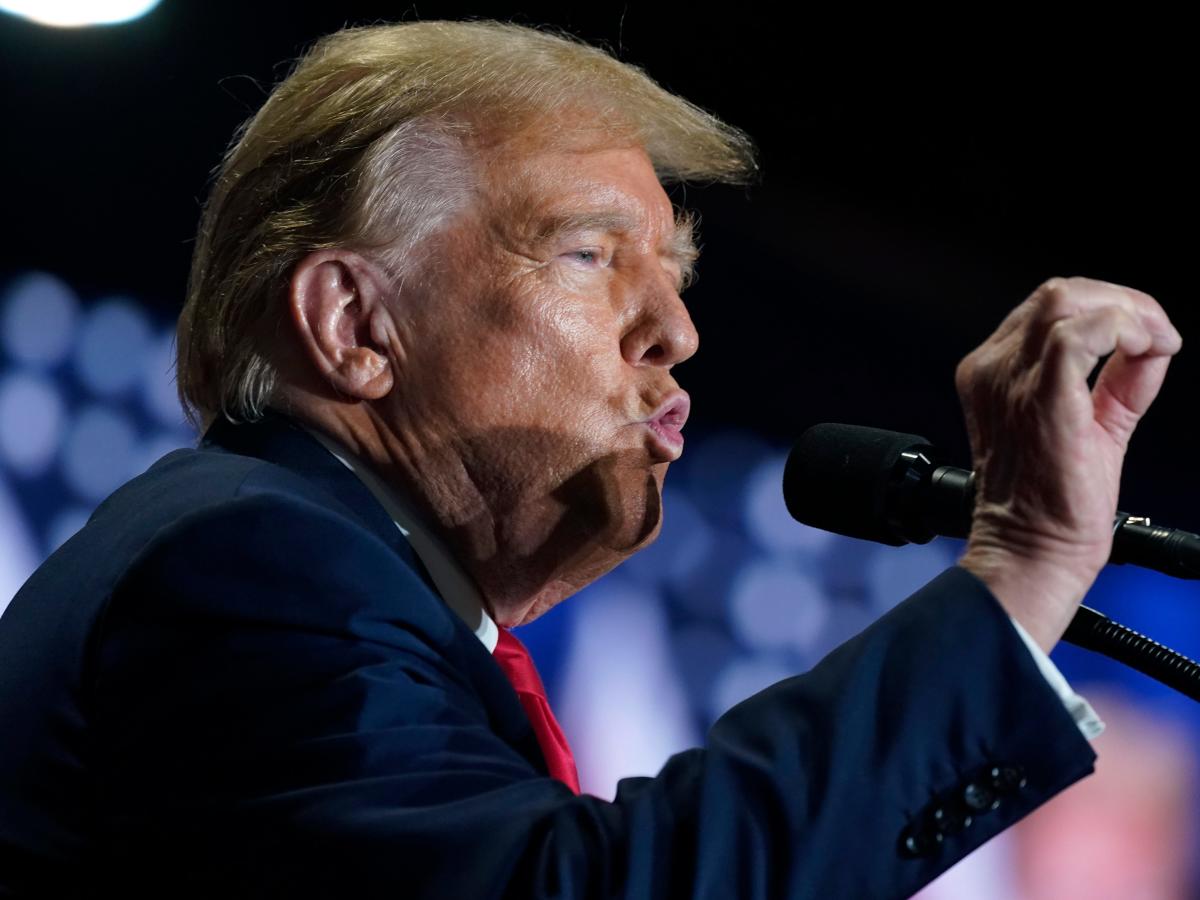In Michigan, Vice President Kamala Harris said Americans should be free to make personal decisions without “their government telling them what to do.”
In Arizona, Minnesota Governor Tim Walz admonished Republicans: “I don’t need you to tell me what books to read. I don’t need you to tell me what religion we are. And I certainly don’t need you to tell me about my family.”
Sign up for the New York Times morning newsletter
And in Philadelphia, as the Democratic presidential ticket made its debut, Walz appeared to make common cause with the “old white boys” he saw in the audience, noting, “Some of us are old enough to remember when it was the Republicans who talked about freedom.”
“There is a golden rule,” he added. “Mind your own business!”
Democrats are making an aggressive new effort to challenge Republican claims to the language and symbolism of freedom. Using traditionally right-wing language and phrases, they are portraying themselves as the true champions of universal American values and their conservative rivals as proponents of deeply intrusive policies that threaten fundamental liberties.
For Harris and Walz, those arguments aren’t quick, throwaway items: They’re a central and consistent part of their pitches, and they often garner the most applause.
Democrats hope that such messages can help their party engage independent voters and the occasional moderate Republican by creating common ground around ideals that transcend differences over, say, tax policy.
“Persuasion isn’t about getting people to change their values — it’s about appealing to values that spread across party lines,” said Transportation Secretary Pete Buttigieg, a Democrat who also campaigned on a freedom message during his 2020 presidential campaign.
“If you want to reach independents,” he continued in an interview, “if you want to open the door to what I like to call future former Republicans, you can — without a false attempt to appear different than you are on policy — play on those issues.”
The focus on freedom often comes with proclamations of patriotism. For Harris, a Black and South Asian Democrat who could become the nation’s first female president, it’s also a way to affirm and define her own American experience, as she runs against a Republican who has a history of exoticizing politicians of color and who has already questioned her racial identity.
President Joe Biden has long insisted that “this is not your father’s Republican Party,” the kind of language that amounts to a “permission structure to change your mind,” according to Anat Shenker-Osorio, a Democratic message strategist.
“It’s not like you have to admit that you went from Faith A to Faith B,” she said. “What happened is that this party, this identity, this group that you belonged to and were part of, failed you. You didn’t fail it.”
Democrats say the transformation of the Republican Party has only become clearer since the 2020 election, when former President Donald Trump tried to overturn his loss. The Supreme Court, controlled by justices he nominated, gutted the constitutional right to abortion, leading to sweeping abortion bans in many states and painful stories of women facing serious health problems. Trump became the first U.S. president to be convicted of a crime and suggested he had no intention of being a dictator — “except on Day 1.”
“The Republican Party used to embrace ideals of freedom, democracy and the rule of law,” said Sen. Amy Klobuchar, Walz’s colleague from Minnesota. “The language, the focus, the party of Donald Trump has turned it on its head.”
At no point have Democrats seen a clearer opening to push this argument than on abortion rights. Since Roe v. Wade was overturned in 2022, the party has repeatedly won elections by framing abortion access as a matter of medical privacy and personal liberty. Its power in a presidential election two years later remains untested — but Democrats are hopeful.
Harris and Walz embrace the message of freedom in every way possible, criticizing government interference in matters of “the heart and the home,” as Harris has said. The governor of Minnesota says “mind your own business” after saying that Republicans believe “government should be free to invade your doctor’s office.”
But more broadly, they also promote an optimistic, unashamedly patriotic vision for the country, with Harris portraying their partnership — forged despite two radically different upbringings in California and Nebraska — as an “only in America” story.
She’s not the first Democrat to sound this note, as the party’s last few nominees might note. And Republicans — skeptical of Democrats’ selective use of anti-big-government language — are also stressing their love of country, as usual.
Trump is known for literally embracing the flag, and his running mate, Sen. J.D. Vance (R-Ohio), has emphasized his service in the Marine Corps.
“The American people will not be fooled by the Harris-Walz campaign on the issue of freedom,” said Steven Cheung, a Trump spokesman, suggesting that among Democrats, far-left ideology “has been forced into almost every aspect of life.” He added: “American voters are fed up with their woke intrusions.”
Other Republicans have ridiculed the Democratic ticket’s message of staying out of other people’s business, with Florida Gov. Ron DeSantis criticizing Minnesota’s COVID-19 restrictions during Walz’s tenure.
Now that the Republicans are out of power, they are painting a much bleaker picture of the situation in the country and the direction it is headed unless they return to the White House.
But Trump has painted an exceptionally dark and grievance-ridden picture of the country today, no rosier than his 2017 inaugural address, in which he described scenes of “American carnage.” It’s a stark contrast to the optimistic ways his Republican predecessors often displayed their patriotism.
Former Rep. Reid J. Ribble, who represented Wisconsin as a Republican but does not plan to endorse Trump or Harris, said he was unimpressed by the Democratic ticket’s concessions to the language of limited government. In practice, he said, “the Biden administration’s policies are designed to use big government to do things.”
The Democratic Party has traditionally embraced the idea that government plays an important role in promoting the public interest, and in many ways that is still the case — though Trump and Vance are not traditional free-market conservatives.
But in terms of messaging, Ribble said he noticed a “role reversal” between the two campaigns.
“It’s always been kind of a traditional Republican mantra to lean into the ‘shining city on the hill,’ the patriotic effort, the Founding Fathers in the U.S. Constitution, and wrap yourself in the flag,” Ribble said. “Now you see the Democrats doing that. And, interestingly, you have the Republicans attacking the vice candidate on the other side because they didn’t like the way he ended his 24-year service in the military.”
Vance has accused Walz of leaving the Army National Guard to avoid deployment to Iraq and of implying he had served in combat when he had not. Harris’ campaign has said Walz misspoke in 2018 when he referred to “those weapons of war, which I carried in wars” when he talked about gun control. Walz this week vigorously defended his broader military record.
More ugly campaign conflicts are taking place.
Trump’s questioning of Harris’ racial identity echoes an old political tactic of portraying nonwhite candidates as outsiders to be viewed with suspicion.
According to Shenker-Osorio, the Democratic message strategist, it is critical to redefine what it means to be American and to call out opponents for their attempts to sow division through whistle blowing.
“The way you do that,” she said, “is by creating a much bigger ‘we’ and being hyper-explicit in saying, ‘In America, across race, place, creed, and background, we believe in our freedoms.’”
Klobuchar argued that it was natural for Harris, a former prosecutor, and Walz, who represented a predominantly rural, conservative district in Congress, to talk about upholding the rule of law or protecting individual liberties, and that the issues were all too relevant in the current election.
“These are not just words that have been taken,” Klobuchar said. “These are words that actually describe where our party is versus where their party is now.”
c. 2024 The New York Times Company




